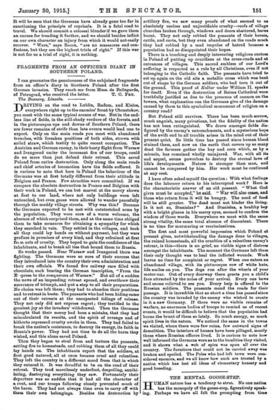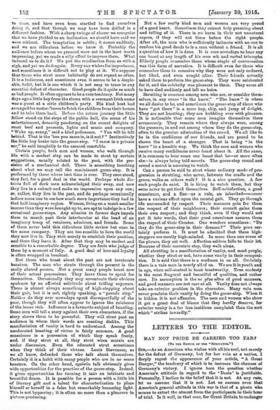THE MENTAL GOOSE-STEP.
HUMAN nature has a tendency to strut. No one nation has the monopoly of the goose-step, figuratively speak- ing. Perhaps we have all felt the prompting from time to time, and have even been startled to fmd ourselves doing it, and that though we may have been drilled in a different fashion. With a sharp twinge of shame we recognize that we have yielded to an inclination we should have said we were without The temptation is subtle ; it comes suddenly, and we are ridiculous before we know it. Probably the audience before whom we pranced were not in the least worth impressing, yet we made a silly effort to impress them. What induced us to do it P We put the recollection from us with a sigh, and yet we do it again. Every one wishes for importance, and sometimes it is difficult not to play at it. We suppose that those who strut more habitually do not repent so often. It is a ladicrous, and sometimes even it seems to be a despic- able, habit, but it is one which it is not easy to trace to any essential defect of character. Good people do it quite as much as bad people. It often appears to be a race tendency. Not many days ago a little boy from the slums with a resonant Irish name was a guest at a civic children's party. His kind host had arranged for motor-'buses to fetch the children from their homes and to take them back. Before the return journey the little fellow stood on the steps of the public hall, the scene of his entertainment, dreamily pondering on the recent delights of rent beef and presents, lights and music and company. "Wake up, sonny," said a kind policeman. "Yon will be left behind. That is the 'bus you came in, is it not P " Instinctively the little boy broke into the goose-step. "I came in a private ear," he said haughtily to the amused constable.
Certain people, both men and women, who walk through Me with a modest step can be made to strut by certain suggestions, usually related to the past, with the pre- elision of a mechanical doll. There is something touching about what we may call the reminiscent goose-step. It is performed by those whose best time is over. They once stood, they feel, for a good deal in the world. Perhaps whole dis- tricts full of dark men acknowledged their sway, and now they live M a suburb and make no impression upon any one; or, rather, they live in the past, and do perhaps occasionally induce some one to see how much more importance they had in that half-imaginary region. Women, livingon a much smaller income than they were brought up to, are apt to indulge in a few occasional goose-steps. Any allusion to former days impels them to march past their interlocutor at the head of an imaginary troop of retainers, admirers, and friends. Some of them never hold this ridiculous little review but once in the same company. They are too sensible to bore the world they now live in. They wish merely to establish their position, and there they leave it After that they may be modest and sensible to a remarkable degree. They am fools who judge of them by a moment of folly. A good deal of love and loyalty is often wrapped in bombast.
Bat those who boast about the put are not inveterate boasters. The man who struts through the present is the really absurd person. Not a great many people boast now of their actual possessions. They leave them to speak for themselves. Occasionally they may accentuate their obvious opulence by an affected solicitude about trifling expenses. There is almost always something of high-stepping about their gait, but it is not, rightly speaking, a "parade step." Neither do they ever nowadays speak disrespectfully of the poor, though they will often appear to ignore the existence of the lesser rich. Influence is a favourite subject of boasting. Some men will tell a story against their own characters, if the story shows them to be powerful. They will strut past an audience in whom their words are creating dislike. This manifestation of vanity is hard to understand. Among the uneducated boasting of virtue is fairly common. A good conscience is a possession of which they speak freely, and, if they strut at all, they strut when morals are under discussion. Even the educated strut sometimes when they think of their virtues. Louis Stevenson, as we all know, defended those who talk about themselves. Certainly it is a habit with many people who are in no sense boasters. On the other band, egoistic talk obviously gives wide opportunities for the practice of the goose-step. Indeed, it gives opportunities for turning it into an intricate and beautiful dance. It is possible for a person with a little bit of literary gift and a talent for characterization to place himself or herself in a false but remarkably becoming light. This is not hypocrisy; it is often no more than a pleasure in picture-producing.
Not a few really kind men and women are very proud of a good heart. Sometimes they cannot help prancing about and telling of it. There is no harm in their not unnatural capers, if they will out them before the right people. After all, the man who is sufficiently intimate with no one to confess his good deeds to is a man without a friend. It is all a question of how it is done. It is rare nowadays to hear any one boast at any length of his own wit and verbal triumphs.
Elderly people remember those whose staple of conversation was this form of narrative. It is difficult even for those who remember them to conceive why they were not only endured, but liked, and even sought after•. Their friends actually asked them to perform the goose-step. They were celebrated for it, and the celebrity was pleasant to them. They seem all to hare died suddenly and left no heirs.
Strutting is common among men who are, or consider them- selves, in any sense "in the know." "The know" is where we all desire to be, and sometimes the goose-step of those who have "got there " is a mere hop, skip, and jump of delight. They are not boasting; they are bubbling over with pleasure.
It is noticeable that some men imagine themselves there erroneously. They remain where they always were, among the guessers, in and out among whom they do the goose-step, often to the genuine admiration of the crowd. We all like to be in the confidence of our friends, and are proud to be shown the heart of a stranger. That is being "in the know" in a humble way. We think the men and women who receive many confidences never boast about it All the same, it is common. to hear some one boast that he—or more often she—is always being told secrets. The goose-step round and round a secret is amusing to watch.
Can a person be said to strut whose ordinary mode of pro. gresaion is strutting, who never, between the cradle and the grave, walks as others walk? It is a nice question. A few such people do exist. It ie tiring to watch them, but they seem never to got tired themselves. Self-satisfaction, a good
conscience, and a fine—as a role, an inberited—manner
have a curious effect upon the mental gait. They go through life surrounded by respect. Their manners gain for them the respect of their neighbours; their conceit gains them their own respect ; and they think, even if they would not put it into words, that their good conscience assures them the respect of their Creator. One 'wonders sometimes "Do they do the goose-step in their dreams ?" Their pens cer- tainly perform it. It must be admitted that these high- steppers are mostly high-minded. In more than one sense of the phrase, they act well Affection seldom falls to their lot. Because of their eccentric step, they walk alone.
All strutting is a manifestation of vanity, and most people, whether they strut or not, bare some vanity in their composi- tion. It is said that there ie a madman in us all. Certainly there is a vain man in nearly all of us. We see it inyouth and in age, when self-control is least trustworthy. True modesty is the most fragrant and beautiful of qualities, and rather rare. Its assumption is the ne plus ultra of good manner and good manners are not rare at all. Vanity does not always tale en exterior position in the character. Many vain men.
never proclaim their vanity by doing the goose-step. When it is hidden it is not offensive. The men and women who show
it get a great deal of blame that they hardly deserve, for exterior vanity is a far less insidious complaint than the sort which" strikes inwardly."



















































 Previous page
Previous page